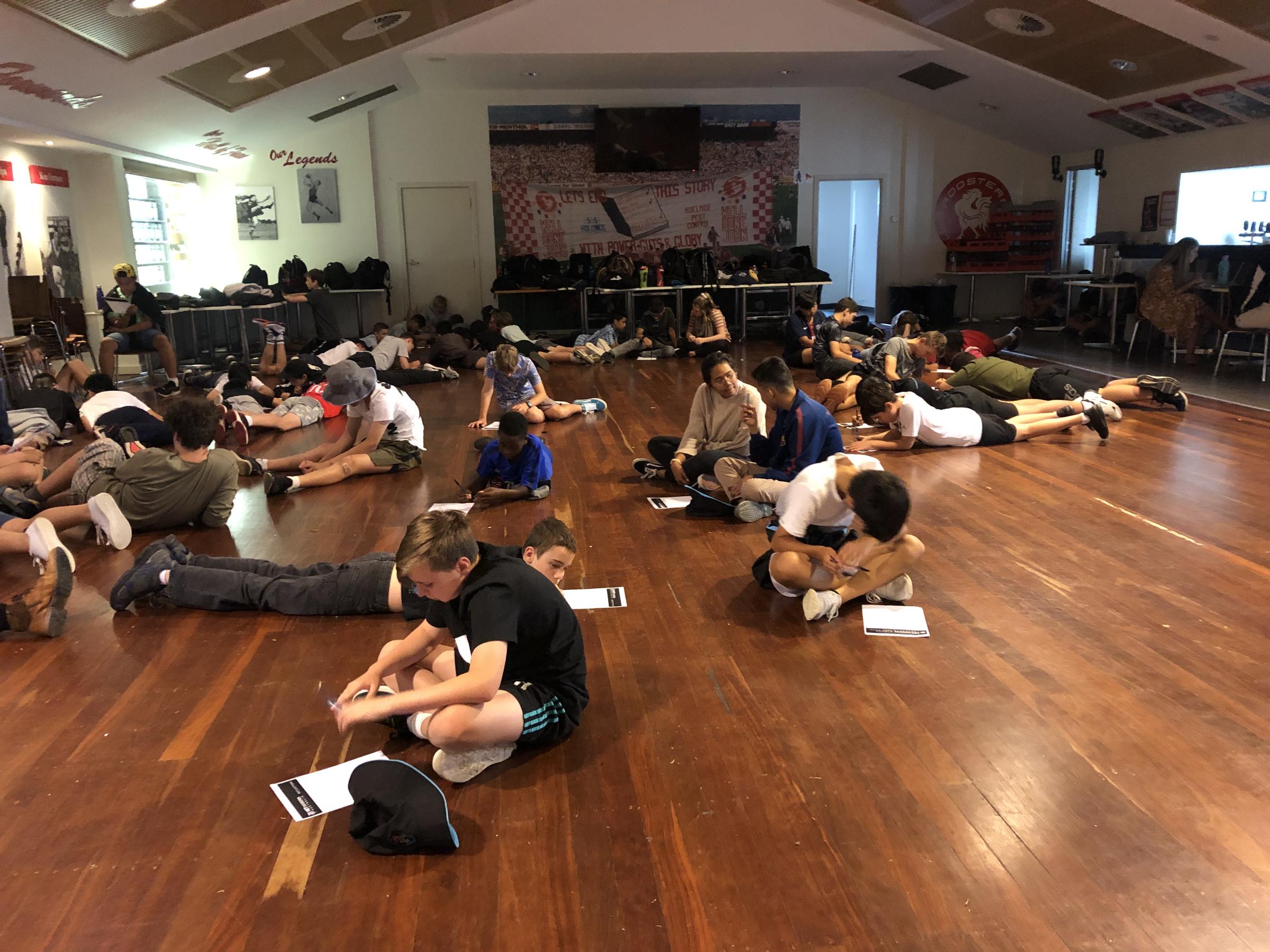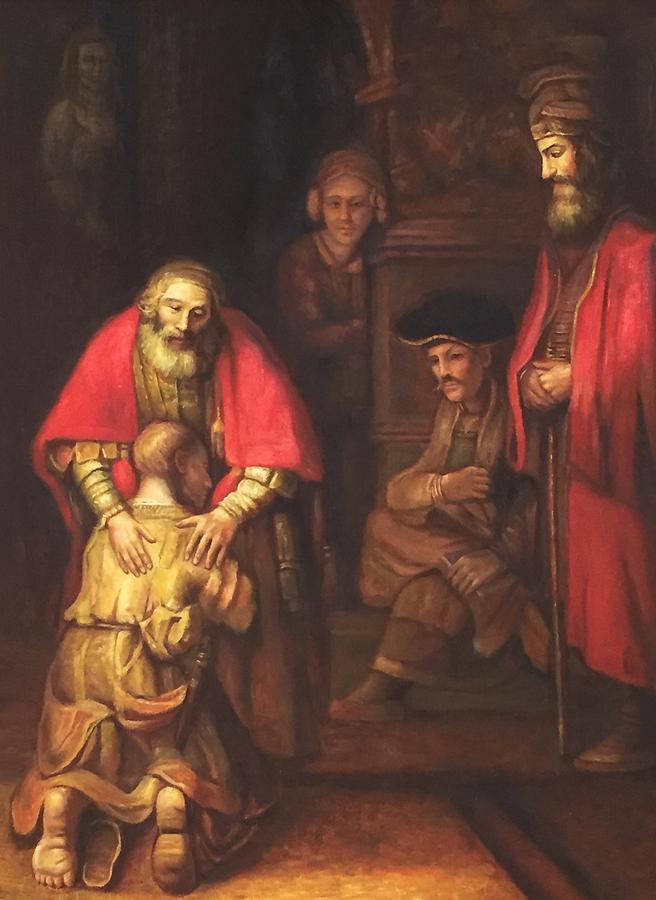Veritas - From the APRIM
Year 8 students recently attended their Reflection Day, facilitated by NET Ministries

Veritas - From the APRIM
Year 8 students recently attended their Reflection Day, facilitated by NET Ministries
Reconciliation and the Parable of the Prodigal Son
Since the start of March eight of our Year 3s and a Year 5 have been preparing for the Sacrament of Reconciliation at Our Lady of the Rosary Church. As it happens, my own 9-year-old twins are also preparing at my local parish.
Lent is a time for examining our own lives and striving to be more like Jesus. It is a time for reconciling our selves with God, because we are intrinsically flawed. The Parable of the Prodigal Son was the Gospel reading of last Sunday, the 3rd Sunday of Lent, and it is the quintessential story for demonstrating the flaws in humanity and God’s infinite love. I’ve heard many homilies and other commentary on this reading, and the following summarises the key lessons I’ve taken from them, based on the characters and the setting of the parable.


The Farm Setting:
The father is a land-owner which would mean his status is high in his culture, is honoured and that he has some wealth. He is a farmer too, and sufficiently successful to employ multiple servants. His two sons are set to inherit this when he dies, as is the custom. They shared in their father’s position of honour in their community. Honour and shame were the most powerful drivers for action in this culture, as it is now in many cultures today.
The Prodigal Son
This younger son asks for his inheritance. This is like saying to his father: “you are dead to me”. Most children do not understand the extent of hurt they inflict on their parents, nor the joy that they give them either.
However, he has heard a call and followed it, as the young and restless often do. As we age and ‘wise-up’, we become better discerners of the ideas that we allow to capture us. This young son did not have the benefit of wisdom. Instead he had lust and excess driving him away.
Times became difficult for him. For those listening to the parable as Jesus told it, they would have understood the extent of this son’s fall from honour to shame when they heard his job was to feed pigs, the lowest of animals.
Jesus describes this son as “coming to his senses”, then deciding to return to his father who he knew would treat him well as a servant, whilst not expecting to be received again as his son. This is the first significantly poignant moment in the parable. The young son makes the choice to turn away from the wrongs that have made him miserable and to head back to his father.
The Father
The Father let his son go without resistance. Only a parent who has lost a child could understand the extent of the sadness he must have felt.
Upon seeing his son return in the distance, he runs to greet him and tenderly embraces him. A 21st century reader misses a key aspect of culture here; no 1st century middle-eastern man runs – that is what children do. It is a shameful act. This is a significant sign of the extent of love the father has for his son. He shames himself, and everyone watching would criticise him for even accepting this son. He embraces him tenderly; the warmth is palpable. From here, he orders that his son is dressed like royalty and that a banquet be prepared in his house. He says his son was dead, and is now alive. Lost, and now found. His elation is also palpable.
The Older Brother
He is obedient and has always pleased his father. Upon the Prodigal’s return though, he is resentful. Perhaps his honour is holding him back. Perhaps he is jealous or even envious that he still receives his father’s love. Perhaps he is jealous of his brother because he has seen the broader world and had other experiences. Perhaps he believes his inheritance will be halved to provide a second time for his brother. His father explains his feelings and reasons for celebrating.
It ends there, with the reader left guessing: does this older brother enter the house or not? I’d like to think he does.
Who are these people and what is this house?
The father is a representation of God and his house is God’s Kingdom. God is deeply saddened when any of His children abandon him. He is equally elated when any one of His children return to Him. His mercy is infinite. Note that he didn’t wait for an apology – he raced to meet his son based on the simple fact he was heading home. The love of the Father converts the son, who is apologetic and penitent. God isn’t angry – anger may have led His son to resent him, not convert him, but this isn’t the point. God is infinite love.
The Prodigal Son represents any of God’s children. He abandoned God and found a loss of life accompanied this choice. He couldn’t live life to the full. He was imprisoning himself. He was in hell. However, his simple decision to return home was enough. This was a decision to turn away from the wrong choices he had made. In a modern context, this could be turning from pornography, drugs, sexual deviancy, gambling, gaming, excessive mobile phone use etc. These all trap the individual in a metaphoric hell and restrict them from living life to the full.
Upon his return the Prodigal son is returned to his Baptismal state of grace. During Baptism, the person is anointed Priest, Prophet and King. Note the royal status symbolised through clothing and jewellery in this parable. A banquet is held in the house. This house is the Father’s house, the Kingdom of God or a metaphoric heavenly state. Heaven is often described as a banquet. The Prodigal has chosen Heaven over hell.
The older brother is described as always good. However, he resents his brother when he returns. He may be caught up in his honour status and wants to maintain this posture to look down at his broken brother. In the process, he reveals his broken self. Again, his anguish is self-inflicted. However, it is not the self-infliction of sinful action, but the self-infliction of the absence of love. This plays out through his refusal to enter his father’s house – God’s Kingdom or Heaven. He opts for the hell that accompanies jealousy, resentment and lovelessness, instead of the heaven that accompanies love.
Above is The Return of the Prodigal Son painting by Rembrandt. Many people regard it as the greatest painting of all time. The great 20th century theologian, Fr Henri Nouwen, sat pondering this painting significantly. He wrote: “…from the story itself, as well as from Rembrandt's painting, it is clear that the hardest conversion to go through is the conversion of the one who stayed home.” God’s Kingdom is for the forgiven, and for the forgiving. This Lent, I encourage you to have the Sacrament of Reconciliation to relieve yourself of the burden of your flaws, and to say sorry to someone you have hurt. I urge you to forgive someone who has hurt you, so as to relieve yourself of the burden of resentment. Being forgiven and providing forgiveness places you in a heavenly state, because of love.
Year 7, 8, 9 and 11 Reflection Day
NET Ministries conducted Reflection Days for Years 7-9 and RealTalk conducted the Year 11 Reflection Day recently. The NET team combined high energy with deep spirituality to take our students further into their faith journey. They report that they enjoyed the day. It was heartening to see the students quietly and purposefully praying during the reflection periods that ended the day. RealTalk spoke to our Year 11s about relationships and the importance of respect. Their theme was “Stronger” and it certainly aimed to direct our students to be self-disciplined with the way they use their masculinity to form deep and gentle relationships and the strength it takes to do this properly. The students report that they enjoyed the day and learned many valuable lessons and perspectives.
The main photo above shows the Year 8 students reflecting at the end of their day, with some praying together or chatting with a member of the NET team.
Mr Matthew Crisanti
ASSISTANT PRINCIPAL: RELIGIOUS IDENTITY AND MISSION